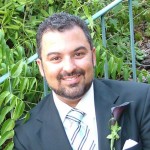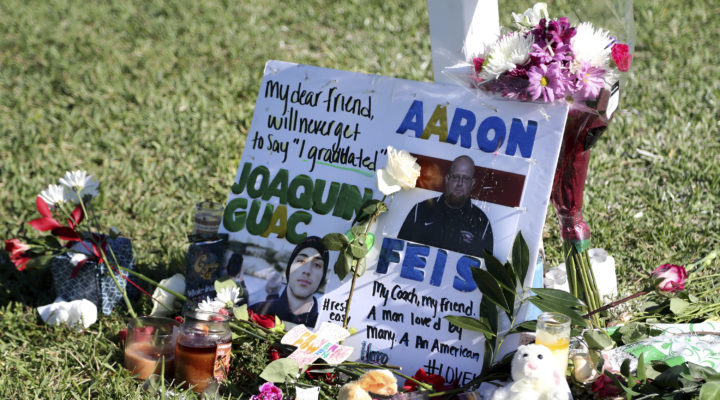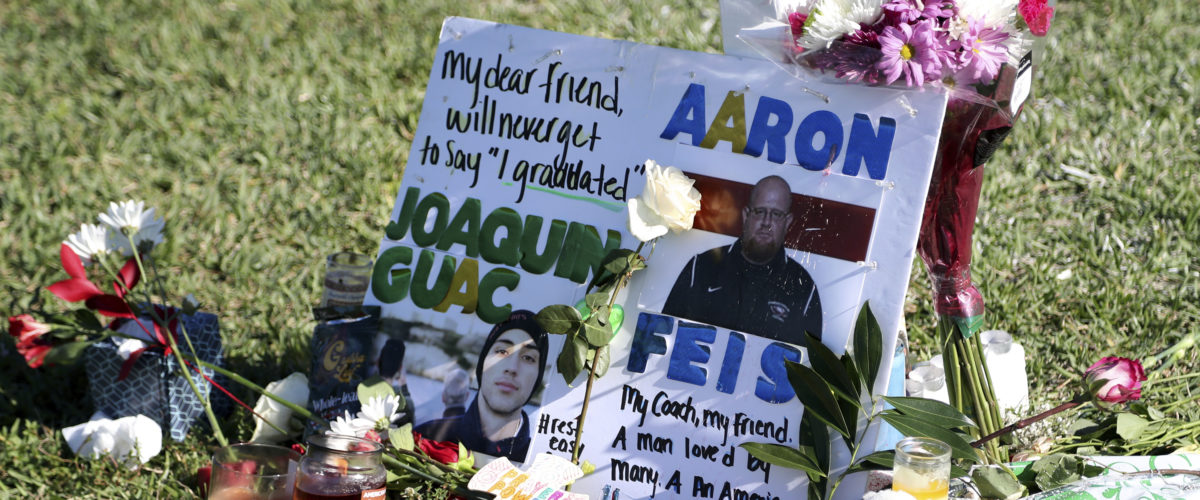The Ash Wednesday massacre Feb. 14 at a Florida high school has, as usual, elicited a range of responses from people of faith. This time, it was a teenager with an assault rifle killing 17 people at Marjory Stoneman Douglas High School in Parkland, Fla., on what was also Valentine’s Day.
Some religious leaders have demanded action to curb gun violence. Others say prayer is the best reaction. Some say both.
But for one Baptist minister in South Florida, the response isn’t political or just spiritual. It’s visceral.
Joe LaGuardia, pastor of First Baptist Church in Vero Beach, graduated in 1996 from Marjory Stoneman Douglas, where one of his best friends was fellow student Aaron Feis — the assistant football coach and security guard who died protecting students from gunfire.

Joe LaGuardia
“Bullets are intended to play pinball inside of the body,” LaGuardia said Friday. “When I found out Aaron was shot, I knew his body was going to be destroyed. I knew that a beautiful body, a beautiful soul, was torn asunder.”
LaGuardia knows how bullets destroy bodies because his father was killed in a mass shooting in Pennsylvania in 2013. He relives that loss every time a new group of children or adults are gunned down by someone with a military-style weapon.
He also relives the frustration that meaningful legislation or conversation has failed to come about on guns and gun violence despite repeated mass killings.
“Our national leaders are so passionate for security that they talk about a wall for the Hispanic community and limited immigration for people from predominately Muslim countries,” LaGuardia said. “They are targeting groups who are not related to mass shootings. … In mass shootings there are prayers and thoughts, but inaction.”
LaGuardia spoke with Baptist News Global on Friday about relieving the agony and how his faith gets him through it.
How are you holding up since the shootings on Wednesday?
Every time things like this happen I relive the nightmare. I usually don’t watch the news. I don’t pay too much attention to the sources in the stories. Yesterday, I took the day off from work because I was too distracted to be useful. I did write an article which was one part catharsis, two parts frustration.
How did your father come to be in the town hall shooting that took his life?
My parents retired up there [Pennsylvania] from Florida and he was very active in local government. He would always go to the town hall meetings to try to improve the community. The person who did the shooting had a decade’s worth of zoning and harassment issues.
Do you experience these painful memories and emotions every time there is a mass shooting?
It’s a nightmare every time. It’s at the point where my wife checks Facebook every morning before I wake up and if something happens, she wakes me up very gently. My wife bans me from the TV these days.
When did you first hear of the shooting in Parkland?
It was from one of our parishioners right before our Ash Wednesday service. I said, “I used to go to school there.” Then I remembered Aaron was in charge of security, so I went into the office to check Aaron’s social media page and that’s when I found out he was in critical condition.”
You and Aaron Feis had been close in high school. Had you remained friends since?
No, just in high school. We lost touch. I moved away. He was working and I was building a family and going to school. But we hung out practically every weekend for two years in high school. And we went to the same church. He was in the youth group. I was in the youth group.
How did it hit you when you learned he had died?
It was hard. I hadn’t talked to him in 20 years but it was surreal because while I don’t have a personal relationship with him now, for me every time a bullet hits a body it’s a nightmare. It evokes what happened to my dad.
Your article mentions Florida Sen. Marco Rubio as a major recipient of gun lobby money. Have you heard from his office?
No, I have not. He’s taking a lot of heat from more people than me. I’m the least of his worries.
What can churches do to make a difference on this issue?
One place to start is defining “sanctity of life.” If we stand for that as evangelicals, what are the repercussions of that? Does it go beyond the womb, beyond fetuses? Does it apply to death row and to people we need to protect from gun violence? And what is the theology that drives that? And how does the biblical text apply to those conversations? In my article I say we are the ones who kill our heroes by neglecting to talk about these issues. We are all culpable.
How do you move from anger to forgiveness and healing at this time?
For me, anger always gets shifted into a theology of suffering and realizing that in the midst of that anger and frustration, Christ shows up in revelation not as a lion but as a slaughtered lamb who walks with me.
Related story:
Some ministers demand action, others reflect after Florida school shootings


